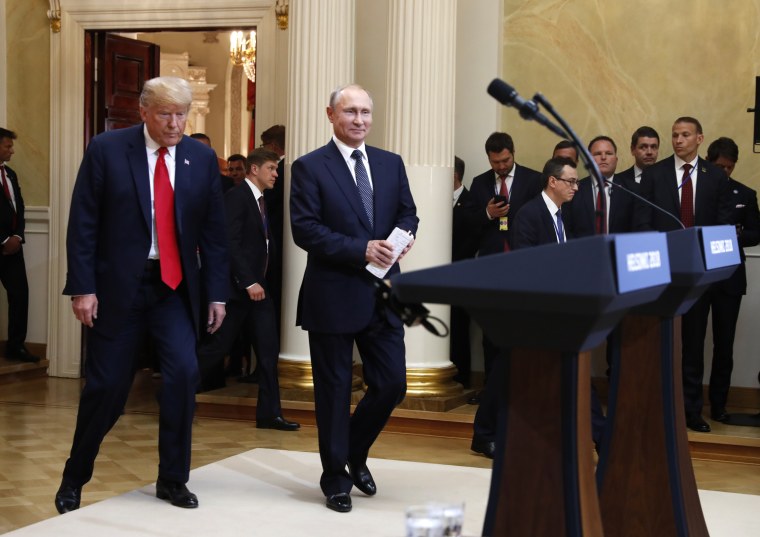About a year ago, a reporter asked Donald Trump whether he believes Russia is still targeting U.S. elections. "No," the president said, shaking his head.
At the time, it touched off yet another Russia-related controversy for the Republican. Trump's years-long insistence that his own country's intelligence was wrong about Moscow's election attack has itself been offensive. But in July 2018, Trump went further, dismissing U.S. intelligence about Russia's future intentions, too.
Yesterday afternoon, on the White House South Lawn, it happened again.
Q: Mr. President, Robert Mueller said last week that Russia is interfering in U.S. elections right now. Did you raise that with Vladimir Putin yesterday?TRUMP: You don't really believe this. Do you believe this?Q: He said it last week. Did you raise that with President Putin yesterday?TRUMP: We didn't talk about that.
Soon after, as part of the same Q&A, a reporter reminded the president, "Mueller said right now, he believes, Russia is interfering with the election." Trump, referring to last week's congressional testimony, replied, "Well, I watched Mueller. I'm not sure Mueller knows what's going on, if you want to know the truth."
In the next breath, the president lied about the former special counsel's findings.
Trump has said a lot of strange things over the last 24 hours, but these comments about Russian election interference were among the most important.
In his sworn testimony on Capitol Hill, Mueller, pointing to Vladimir Putin's 2016 attack, said, "[T]his wasn't a single attempt. They're doing it as we sit here -- and they expect to do it during the next campaign."
As far as Trump is concerned, his own credibility crisis notwithstanding, Mueller was not a reliable witness and his assertions are not to be trusted. I think that's absurd, but for the sake of conversation, let's play along for a moment. Let's put aside the former special counsel's warnings altogether.
What about FBI Director Chris Wray's sworn congressional testimony last week, when he told lawmakers, "The Russians are absolutely intent on trying to interfere with our elections"?
Of course, Trump no longer holds Wray in high regard either, but we don't have to stop there. The Washington Post ran an analysis last week highlighting the many Trump administration officials -- intelligence personnel, cabinet secretaries, ambassadors, et al. -- each of whom have said U.S. election officials are at risk of Russian interference.
It wasn't a short list, but by all appearances, Trump doesn't believe any of them.
And why is that important? Aside from the obvious concerns about the president's discomfort with his own country's intelligence assessments, the fact remains that if Trump doesn't believe Russia is targeting the 2020 elections, it stands to reason he won't support steps to defend our elections against the next attack.
For that matter, if Trump opposes new safeguards intended to bolster our defenses, Senate Majority Leader Mitch McConnell (R-Ky.) will also probably continue to block bipartisan election-security legislation, even if it fuels "Moscow Mitch" criticisms.
Willful ignorance, in other words, comes with real consequences.
